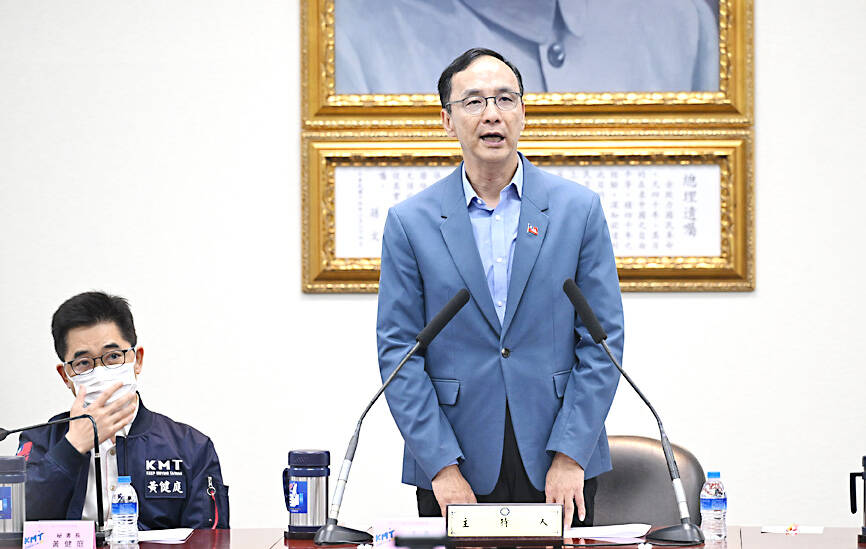The Chinese Nationalist Party’s (KMT) presidential ticket topped their Democratic Progressive Party (DPP) rivals by 0.8 percent in an internal poll, KMT Chairman Eric Chu (朱立倫) said at a meeting of its Central Standing Committee in Taipei yesterday.
Support for New Taipei City Mayor Hou You-yi (侯友宜) and Broadcasting Corp of China chairman Jaw Shaw-kong (趙少康), the KMT’s presidential and vice presidential candidates, has been rising recently.
The party’s daily internal poll yesterday showed that support for the pair had overtaken the DPP’s candidates, Vice President William Lai (賴清德) and his running mate, former representative to the US Hsiao Bi-khim (蕭美琴).

Photo: Chang Chia-ming, Taipei Times
The KMT needs more support among people aged 20 to 40, as well as in southern Taiwan, including Tainan and Kaohsiung, and Pingtung, Yunlin and Chiayi counties, Chu said.
The party’s candidates are leading in Taipei, New Taipei City, Keelung, Taoyuan and Taichung, as well as in Hsinchu, Miaoli, Changhua and Nantou counties, he said.
The KMT must consider strategies to flip regions with low support, he said.
KMT estimates show there would be “major” contention over 15 legislative seats, Chu said, adding that winning in those regions would determine whether the KMT regains a legislative majority.
KMT secretary-general Huang Chien-ting (黃健庭) and the party’s Organization and Development Affairs Committee are to review strategies to secure legislative seats, he said.
Chu asked party members to help with the election effort, making special mention of the work that former legislative speaker Wang Jin-pyng (王金平) and other party members who are local council speakers have done for its campaigns.
The KMT is concerned about the welfare of young people, which is reflected in its campaign platforms, Chu said.
The KMT supports waiving down payments and providing subsidies for young people who buy property, allowing more to own their own home, he said.
It supports state-funded after-class consultation for elementary-school students to ease the burden on parents, he said.
Separately, Hou told a news conference on Tuesday that if elected president, he would introduce free after-school care for children aged six to 12.
The scheme would benefit about 300,000 families, including 80,000 considered “underprivileged,” he said.
The program would provide after-school care until 7pm, including during vacations, he said, adding that it would allocate NT$5.4 billion (US$171.29 million) in the first year, rising to NT$8 billion in the 2024-2025 academic year and NT$10 billion in the 2026-2027 academic year, he said.
The policy would create “a safe environment for children and their parents” and “provide a sound and reliable service for less-privileged students,” Hou said.
The program would be offered whenever parents need it, he added.
In addition, special classes would be provided for underprivileged children, as well as those living in remote areas and those with disabilities, he said.
Access to the program would be expanded to cover about 360,000 children, or about 30 percent of students nationwide, he said.
The addition of an extra 20,000 after-school care classes would bring Taiwan on par with the level set by the Organisation for Economic Co-operation and Development, he said.
The program would help create jobs, giving young people seeking work in the education sector more employment opportunities, he said.
Government data showed that there were 26,731 after-school care classes for 445,882 students at 1,926 public schools during the 2022-2023 academic year.
Additional reporting by CNA

‘DENIAL DEFENSE’: The US would increase its military presence with uncrewed ships, and submarines, while boosting defense in the Indo-Pacific, a Pete Hegseth memo said The US is reorienting its military strategy to focus primarily on deterring a potential Chinese invasion of Taiwan, a memo signed by US Secretary of Defense Pete Hegseth showed. The memo also called on Taiwan to increase its defense spending. The document, known as the “Interim National Defense Strategic Guidance,” was distributed this month and detailed the national defense plans of US President Donald Trump’s administration, an article in the Washington Post said on Saturday. It outlines how the US can prepare for a potential war with China and defend itself from threats in the “near abroad,” including Greenland and the Panama

A wild live dugong was found in Taiwan for the first time in 88 years, after it was accidentally caught by a fisher’s net on Tuesday in Yilan County’s Fenniaolin (粉鳥林). This is the first sighting of the species in Taiwan since 1937, having already been considered “extinct” in the country and considered as “vulnerable” by the International Union for Conservation of Nature. A fisher surnamed Chen (陳) went to Fenniaolin to collect the fish in his netting, but instead caught a 3m long, 500kg dugong. The fisher released the animal back into the wild, not realizing it was an endangered species at

The Chinese Nationalist Party (KMT) is maintaining close ties with Beijing, the Democratic Progressive Party (DPP) said yesterday, hours after a new round of Chinese military drills in the Taiwan Strait began. Political parties in a democracy have a responsibility to be loyal to the nation and defend its sovereignty, DPP spokesman Justin Wu (吳崢) told a news conference in Taipei. His comments came hours after Beijing announced via Chinese state media that the Chinese People’s Liberation Army’s Eastern Theater Command was holding large-scale drills simulating a multi-pronged attack on Taiwan. Contrary to the KMT’s claims that it is staunchly anti-communist, KMT Deputy

The High Prosecutors’ Office yesterday withdrew an appeal against the acquittal of a former bank manager 22 years after his death, marking Taiwan’s first instance of prosecutors rendering posthumous justice to a wrongfully convicted defendant. Chu Ching-en (諸慶恩) — formerly a manager at the Taipei branch of BNP Paribas — was in 1999 accused by Weng Mao-chung (翁茂鍾), then-president of Chia Her Industrial Co, of forging a request for a fixed deposit of US$10 million by I-Hwa Industrial Co, a subsidiary of Chia Her, which was used as collateral. Chu was ruled not guilty in the first trial, but was found guilty